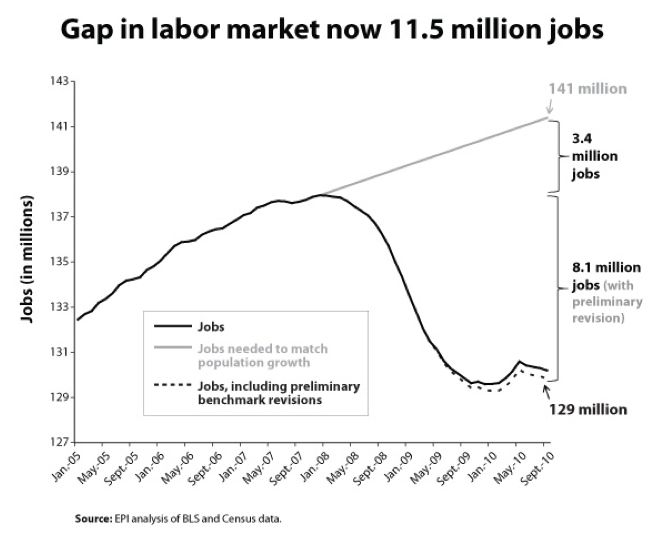But with respect to economic reforms, with single payer health care at the top of the list, there can be hidden quasi deadlines. Every year that single payer is not enacted is another year where health costs rise higher than general inflation, is another year where the gap between health costs and peoples' incomes becomes wider, is another year where people are ruined due to lack of health care, and is another year where in general the rich get richer and the large and growing number of relative poor get poorer.
The wider the gap between rich and poor, the greater the poverty rate, and the bigger the per capita income gap between the US and the other countries (that do have single payer) the more economically difficult it becomes to implement single payer, and the less the expected payoff becomes, in economic terms, from enacting single payer. For one thing, the ever growing number of relative poor people have less and less taxable income, which means that a higher and higher tax hike on the rich is necessary to finance single payer as the years of delay accumulate. For another thing, as the years go by, the gap between the actual health costs being charged within the failed health insurance system and the costs that a reasonable single payer system could support is growing.
In general of course, the US economy as a whole, and the average person in it, is being damaged worse and worse every year that health costs run out of control due to lack of single payer.
At the same time, in economic terms (although not in health terms) the "rescue beneifits" of single payer are being gradually reduced every year that single payer is delayed. People going without health care are becoming sicker and sicker, and thus more expensive to treat if single payer were ever enacted. And the damage to the US economy is mounting year by year and has apparently already reached the point where it can not be fully repaired by single payer.
The victory of the reputable, single payer countries over the US with respect to the health care and the overall economics systems is due not just to the existence of single payer in those countries, but also due to correct timing, specifically the fact that most of the single payer countries enacted single payer many decades ago, when the economic benefits for doing so were truly large.
Meanwhile, the US keeps delaying, and the potential economic benefits are gradually going down. It is possible that the US has already reached the point where its citizens could not possibly be as well off, in the next few decades at least, even if single payer were enacted in 2009, as for example citizens of Europe will be with their well established over many decades single payer (and unemployment relief) systems.
On the other hand, it will be at least 50 years before the economic benefits from enacting single payer in the US will become small or trivial; all I am saying right now is that the benefits are gradually being reduced, and that the benefits are already substantially less than the benefits would have been had single payer been enacted 20, 30, or 40 years ago.
In summary, in economics (unlike with most social reforms such as abolishing slavery) sometimes you can delay a needed reform to the point where the benefits of it become much smaller than they used to be, and the costs much higher than they used to be.
What I am talking about is why single payer systems are completely out of the question in very poor countries, such as for example many countries in Africa, Central America, and South America. The best a truly poor country can do is a partial, modified single payer system, with for example free care clinics that are partially subsidized by the Government playing a role in increasing health care access. But no truly poor country (unless it becomes a dictatorial left country in the Cuba mode) can successfully maintain a true single payer system in the European/Australian/Japan mode.
Although most of the right wing is too dumb to understand economics concepts such as these, you can bet at least a small number of influential right wingers are aware of these things, and as a result are supporting the fake "health reform" that is being talked about in 2009, which when all is said and done is nothing more and nothing less than a delaying tactic against single payer.
[The above was in response to this article.]
LATEST 20 POSTS, SOME VERY SHORT, SOME RATHER LONG
Welcome to One and All
This is not my only Internet project by a long shot, and Internet producing is not my only activity by a long shot. Although Unity-Progress may very well be theoretically my most important project, resources are limited for it at this time. I have the resources to produce about 5,000 words a month for Unity-Progress. To put this in perspective, 5,000 words are about 250 tweets, 20 very short "blog entries", ten longer blog entires, five short articles, two long articles, or 1/20 of a longer book. I do guarantee these 5,000 words will be produced and that they will be as informative and perfectly accurate as possible.
Unfortunately though, there will be wide variability from month to month. It is possible that nothing at all will be posted in a month, but at the other extreme, there will be a month now and then where about 10,000 words are produced. Another thing leading to variability is that there is no production template as of yet, meaning that postings will vary radically from very, very short to quite long. At this time it appears this variability will continue indefinitely.
Aside from the postings, there are numerous very important features that go along with this project to be found on numerous pages. Look for links to them; see especially the links just under the banner and the ones in the right sidebar near the top.
Finally, please know that you absolutely have to bookmark this site if you ever ever want to come back because it is not easy to find this Site or any other Sites of its kind on Google Search. In fact, most of the characteristics of this Site are precisely the ones that get the short shrift by the Google Search Engine formulas.
Unfortunately though, there will be wide variability from month to month. It is possible that nothing at all will be posted in a month, but at the other extreme, there will be a month now and then where about 10,000 words are produced. Another thing leading to variability is that there is no production template as of yet, meaning that postings will vary radically from very, very short to quite long. At this time it appears this variability will continue indefinitely.
Aside from the postings, there are numerous very important features that go along with this project to be found on numerous pages. Look for links to them; see especially the links just under the banner and the ones in the right sidebar near the top.
Finally, please know that you absolutely have to bookmark this site if you ever ever want to come back because it is not easy to find this Site or any other Sites of its kind on Google Search. In fact, most of the characteristics of this Site are precisely the ones that get the short shrift by the Google Search Engine formulas.
Subscribe to:
Post Comments (Atom)

EVERY POST SINCE THE START OF UNITY-PROGRESS ON JANUARY 1, 2009
Loading
Blog Archive
-
►
2010
(89)
- ► 06/27 - 07/04 (1)
- ► 06/20 - 06/27 (7)
- ► 06/13 - 06/20 (1)
- ► 06/06 - 06/13 (1)
- ► 05/23 - 05/30 (2)
- ► 04/11 - 04/18 (1)
- ► 03/21 - 03/28 (4)
- ► 03/14 - 03/21 (4)
- ► 03/07 - 03/14 (2)
- ► 02/28 - 03/07 (2)
- ► 02/14 - 02/21 (3)
- ► 02/07 - 02/14 (2)
- ► 01/31 - 02/07 (5)
- ► 01/24 - 01/31 (6)
- ► 01/17 - 01/24 (17)
- ► 01/10 - 01/17 (23)
- ► 01/03 - 01/10 (8)
-
▼
2009
(164)
- ► 12/27 - 01/03 (11)
- ► 12/20 - 12/27 (13)
- ► 12/13 - 12/20 (3)
- ► 12/06 - 12/13 (6)
- ► 11/29 - 12/06 (3)
- ► 11/22 - 11/29 (7)
- ► 11/15 - 11/22 (8)
- ► 11/08 - 11/15 (5)
- ► 11/01 - 11/08 (6)
- ► 10/04 - 10/11 (2)
- ► 09/13 - 09/20 (5)
- ► 09/06 - 09/13 (14)
- ► 08/30 - 09/06 (9)
- ► 08/23 - 08/30 (11)
- ► 08/16 - 08/23 (11)
- ► 08/09 - 08/16 (5)
- ► 08/02 - 08/09 (3)
- ► 07/26 - 08/02 (4)
- ► 07/19 - 07/26 (6)
- ► 07/12 - 07/19 (9)
- ▼ 07/05 - 07/12 (3)
- ► 06/28 - 07/05 (1)
- ► 06/21 - 06/28 (2)
- ► 06/14 - 06/21 (4)
- ► 06/07 - 06/14 (2)
- ► 05/31 - 06/07 (2)
- ► 05/17 - 05/24 (1)
- ► 05/10 - 05/17 (4)
- ► 05/03 - 05/10 (1)
- ► 04/26 - 05/03 (1)
- ► 03/08 - 03/15 (1)
- ► 02/22 - 03/01 (1)
-
►
2008
(2)
- ► 12/28 - 01/04 (2)

THINK AGAIN IF YOU THINK BEING FORCED TO BUY INSURANCE IS A GOOD LONG TERM PLAN

OIL GUSHER COVERAGE
BARRELS VERSUS GALLONS
1 barrel = 42 gallons
1 thousand barrels = 42 thousand gallons
1 million barrels = 42 million gallons
GUSHER ESTIMATE
-70 thousand barrels a day = 2,940,000 gallons per day
-70 thousand barrels per day for 60 days April 21 through June 19 = 4,200,000 barrels = 176,400,000 gallons (176.4 million gallons)
-70 thousand barrels per day for 120 days April 21 through August 18 = 8,400,000 barrels = 352,800,000 gallons (352.8 million gallons)
A BILLION GALLONS OF OIL?
At 70,000 barrels a day a billion gallons of oil would be reached on March 27, 2011.
1 barrel = 42 gallons
1 thousand barrels = 42 thousand gallons
1 million barrels = 42 million gallons
GUSHER ESTIMATE
-70 thousand barrels a day = 2,940,000 gallons per day
-70 thousand barrels per day for 60 days April 21 through June 19 = 4,200,000 barrels = 176,400,000 gallons (176.4 million gallons)
-70 thousand barrels per day for 120 days April 21 through August 18 = 8,400,000 barrels = 352,800,000 gallons (352.8 million gallons)
A BILLION GALLONS OF OIL?
At 70,000 barrels a day a billion gallons of oil would be reached on March 27, 2011.



No comments:
Post a Comment